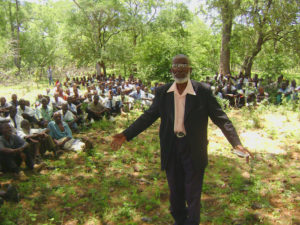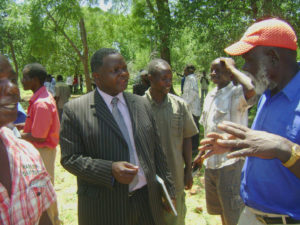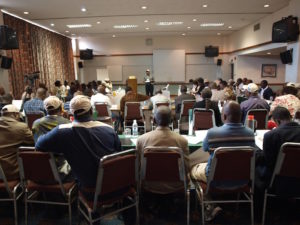
The following case study is an extract from Protecting Community Lands and Resources in Africa, a book of case studies that highlights land rights advocates’ innovative community land protection efforts.
BY GILBERT MAKORE, ZIMBABWE ENVIRONMENTAL LAW ASSOCIATION (ZELA)
The Zimbabwe Environmental Law Association (ZELA) is a public interest law organization that works to promote improved natural resources governance in Zimbabwe. The organization was formed in 2000 and legally constituted as a Common Law Trust in November 2001. ZELA works to promote environmental justice, sustainable and equitable use of natural resources, and good governance in the natural resources and environment sector. The organization works to help poor and marginalized communities assert and claim their environmental, economic, social and cultural rights. ZELA also seeks to ensure that environmental and natural resources management policies, strategies and legal frameworks respond positively to the needs of marginalized women, men and youths living in urban and rural communities. ZELA works across different environmental sectors such as mining, forest management, wildlife management, energy, land, agriculture, water resources management and environmental and social services delivery in urban areas.
ZELA is currently primarily working on the extractive sector in Zimbabwe. The organization is working with communities in Manicaland and those along the Great Dyke. The Manicaland communities are impacted upon by diamond mining operations while those along the Great Dyke are affected by gold, chrome, granite, platinum and diamond mining operations. In working with these local communities, ZELA conducts research, conducts rights awareness training meetings, assists the communities to self-organize, creates platforms for engagement between local communities and duty bearers (legislators, councilors, Rural District Councils and government representatives).

A local community member, Mr. Martin Ziduche, in Marange describes the negative impacts of diamond mining and forced evictions that his community has experienced. © ZELA
Mining operations in Zimbabwe operate within an economic enclave that is de-linked from other sectors of the economy. The result is that mining operations impose high negative social costs on local community members, with very limited benefits. Communities in mineral resource-rich areas suffer from mining-induced irregular displacements, degradation of their lands and environment, loss of life and livestock to deep open pits left by mining operations, and loss of communal land and natural resources. Because local communities do not have strong communal title, mining companies typically fail to pay compensation to local community members in cases where they are displaced. The Mines and Minerals Act of 1961 also prioritizes mining over other land uses, further weakening communities’ land rights. There is often perceived collusion between Government and mining companies due to Government’s efforts to promote investments “at all costs.” Indeed, the state is now playing an increasingly direct role in mining through establishing mining operations or claiming stakes in mining operations. This conflict of interest often results in government failing to protect the rights of local communities.
In 2010, the community of Marange faced forced relocation due to diamond mining operations. Initially 136 families were earmarked for relocation; the number of families has since risen to 4,321. The companies involved in mining projects included Mbada Diamonds, Diamond Mining Corporation, Canadile, Anjin, Jinan, Rera Diamonds and Marange Resources. The companies were looking to relocate communities without paying fair and adequate compensation and before the development of adequate social infrastructure (education and health) at the relocation site in Arda Transau.
The mining companies besieged the community, catching them unprepared to resist the eviction. There was no official notice given to the community members that were earmarked for relocation. Given the surprise, the immediate response was not a concerted effort to refuse relocation. Some community members accepted the relocation because they felt they had no choice and the community had not yet mobilised to resist the demands of the mining companies. Many were relocated forcefully, in the dead of the night or at gun point. Others resisted the relocation process and demanded fair and adequate compensation before they were moved.
The relocation process posed a serious threat to the health and livelihoods of local community members. The mining companies and complicit government officials threatened to relocate the communities to a farm just outside Mutare (Arda Transau) before housing, schools and clinics had been put in place. Some community members were initially settled in tobacco-curing barns because there were no housing facilities at the relocation site. This risked a potential health crisis due to the lack of sanitation facilities. The absence of adequate housing and the arbitrary, violent nature of the relocation process also meant human life was at risk. In addition, once relocated, some community members lost livestock when they failed to adjust to the new environment. Some of the relocated community members also lost livelihoods as they had been primarily engaged in trading and in farming on lands that they now could not access.

Zela staff members listen to Marange communities on a tour of the negative impacts their community has experienced from diamond mining on their lands. © ZELA
ZELA’s approach to supporting Marange was largely informed by ZELA’s overall engagement strategies of research, training and capacity building, advocacy and litigation. ZELA began working with Marange as part of its legislative support project. Through this project, ZELA works with Members of Parliament from resource rich areas to strengthen their capacity to represent the rights and interest of their constituencies with respect to resource governance. The project also aims at strengthening the legislative and oversight roles of legislators in the natural resources sector. Project activities include creating platforms for legislators to interact and interface with local communities. One of the legislators who received ZELA’s support under this project was the Honourable Shuah Mudiwa of Mutare West Constituency, the same area of the Marange diamond mine project. Through this connection, ZELA began work in Marange and expanded its programme of support in the area.
ZELA tailors its strategies based on community members’ knowledge of their rights, the urgency of the situation, and the level of engagement by government and companies involved. ZELA began its work in Marange by conducting a rapid assessment of community members’ knowledge of their rights. This was done in the community facing the relocation by holding focus group discussions and administering questionnaires. It is important to note that the community area was not easily accessible as it had been declared a Protected Area under the Protected Places and Areas Act of Zimbabwe. This meant that movement in and out of the community was regulated by the police and required official permission to travel. To gain access to the community, ZELA went as part of the Member of Parliament’s entourage.
Simultaneous to the rapid assessment, ZELA also carried out informal enquiries and research to determine the government and mining companies’ plans for the relocation. It was during this period that ZELA established that the relocation process was being done irregularly and with reckless abandon. There was no communication with the local community and announcements about scheduled move dates were inadequate. Some trucks showed up at homesteads and demanded that community members move immediately. In some cases notice was given but it was woefully inadequate. In addition, ZELA established that the community had not organised into a cohesive voice.
ZELA then began holding rights training workshops focusing on the communities’ environmental, economic, social and cultural rights, particularly those violated by the relocation process and diamond mining activities in Marange. The idea was to build community confidence and overcome the environment of pervasive fear. At the same time, ZELA began generating media awareness around the situation in Marange in an effort to alert the Zimbabwean public about the situation and shame the mining companies and government. Generating media interest was an important and strategic role for ZELA to take because the unfolding situation in Marange was essentially shut off from the media due to Marange being rural and cordoned off as a Protected Area. In addition, media stories were important for catching the attention of the Kimberly Process Certification Scheme, the body charged with oversight over the sale of rough diamonds globally, of which Zimbabwe is a member. This was important insofar as it resulted in the KPCS intervening to stop the sale of Marange diamonds until various security issues were addressed.
ZELA impressed upon the community members of Marange the importance of self-organising and self-mobilisation. Armed with this information, the community members decided to establish a community based organisation (CBO), the Chiadzwa Community Development Trust (CCDT).[1] This CBO was established with the support of ZELA and soon grew to be an incredible local force for resisting relocation. Community members began to coalesce around the Trust which in turn grew in voice and influence.
ZELA supported CCDT to take the government and some of the mining companies (Mbada Diamonds, Canadile Mining and the Zimbabwe Mining Development Corporation) to court. ZELA assisted the CCDT to file an urgent High Court application against the mining companies and various government departments. The goal was an official order to stop the Zimbabwe Mining Development Corporation, Canadile Mining, Mbada Mining, the Minister of Mines and Mining Development and the Minister of Local Government, Urban and Rural Development from carrying out relocations until there was clarity and agreement in terms of compensation for the displaced. It is important to note that while undertaking litigation, ZELA also pursued aggressive advocacy. The organisation engaged Parliamentarians to raise awareness on the situation in Marange and built up the resolve of the community to resist the relocation.
The urgent court application was dismissed by the High Court on the grounds that it was not urgent, since diamond mining had been ongoing in the area two years before the matter was brought to court. However, immediately following the case, the government and the mining companies increased communication with affected communities and began evaluating properties in Marange in order to provide compensation. There was also a stop to the rushed displacements that had preceded the court case and advocacy efforts of ZELA. In addition to the immediate response measures, Government and the mining companies began infrastructure development at Arda Transau. The mining companies have since built houses, schools, roads and other amenities at the relocation site. Some few people, particularly local business people, have also been given compensation. Even though the legal case was thrown out, it was successful insofar as it raised the situation in Marange to national prominence and forced government to respond.
[1] Chapter 5 includes a case study from CCDT concerning its efforts to protect women’s rights and interests in the context of the diamond mining developments in Marange.
ZELA’s support of Marange was successful because they used various strategies simultaneously. The organization used awareness raising, community mobilization, advocacy and litigation as part of its strategy arsenal. It is likely that pursuing one strategy would have failed to achieve the same results. It was combined pressure on a number of levels that forced government and mining companies to take notice of the issues experienced by the Marange community and those relocated to Arda Transau.
At the same time, another reason for ZELA’s success is that ZELA worked closely with the local community members throughout. The organization worked to ensure its own obsolescence in the community by supporting the establishment of CCDT, the community’s CBO, capacitating it and ensuring that it took lead in the litigation process. This also ensured that the community would build up self-confidence to challenge unjust systems, practices and laws in the future.
ZELA’s multi-pronged strategy worked because the organization was fearless and creative in pursuing justice for the local communities. The situation in Marange was and remains highly political. There are many vested interests involved and Marange diamond mining is a politically contested terrain. The effect is that the environment is not one that is easy to work in. ZELA, however, was resolute in challenging government and the mining companies directly including through use of litigation.
While ZELA counts this case as a success, the organization recognizes that justice for the relocated community members has still not been fully realized. The schools that were built in the relocation area do not fully accommodate all children and most of the relocated families have yet to receive compensation. ZELA has therefore learnt the importance of sustaining its advocacy and litigation efforts to ensure the full protection and realization of community rights in the face of corporate and state projects.

Marange community members and Zela present concerns about diamond mining activities and relocations to the government. © ZELA
In a highly political environment (like Marange), it is necessary for any NGO intervening gathers factual data. This enhances the integrity of the organization and ensures that its intervention is above reproach. Where there is no evidence, there is a high likelihood that any claims of rights violations would be dismissed as sensationalistic.
It is also important to find sympathetic ears within government or institutions such as Parliament. These institutions are not monolithic. In the case of Zimbabwe, legislators within Parliamentary Portfolio on Mines and Energy became key allies in trying to expose the rights violations in Marange. This is despite the legislators coming from different political parties including the ruling party.
Pursuing various strategies is also important when faced with a case of continued rights violations. Litigation, in countries like Zimbabwe is costly and may take time. Communities are, therefore, likely to get disillusioned. It is therefore important to use multiple strategies while being wary of spreading the organization thin. A key strategy in this case may be leveraging local networks and alliances. ZELA worked with organizations such as Zimbabwe Lawyers for Human Rights in conducting some of the first rights training meetings in Marange. It was effective for the organizations to pool resources.
It is also important to ensure that the work is grounded in the local community. Research, advocacy and litigation efforts that are totally divorced from the actual community members do not galvanize the community and are not sustainable. In Marange, ZELA worked towards its own obsolescence by building up a cadre of community activists who took the lead on resisting relocation and holding the government to account.